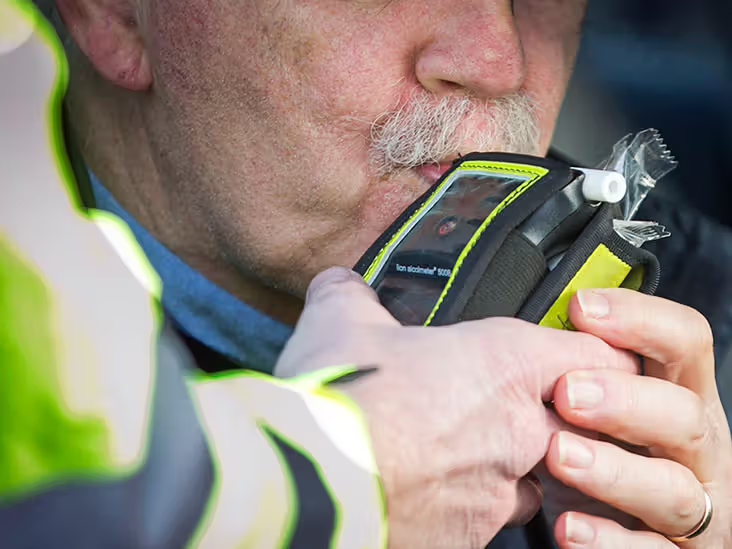How Accurate Are Breathalyzer Tests in Worcester OUI Arrests?
Driving is inherently dangerous. You take your life in your hands when you get behind the wheel. You also have a responsibility toward others you may encounter on the road. Drinking alcohol and then driving (operating under the influence, or OUI) increases the danger to yourself and others dramatically.
Reducing the number of drivers under the influence is for the public good. Massachusetts police officers will not hesitate to pull you over if they feel that you’re exhibiting signs of intoxication, like weaving, not maintaining your lane, running red lights or stop signs, etc.
Once they’ve pulled you over, they may ask you to perform field sobriety tests, but you’ll also be asked to take a breathalyzer test. Breathalyzers estimate the amount of alcohol in your bloodstream based on the alcohol on your breath.
In Massachusetts, the maximum blood alcohol concentration (BAC) is 0.08%. If you register that or higher on the breathalyzer, you’ll be arrested for OUI. However, many things can affect breathalyzer test accuracy, meaning that you could be facing OUI charges even if you weren’t driving drunk, or sometimes even if you hadn’t had anything to drink at all.
Why Do Police Use Breathalyzer Tests During OUI Investigations?
Police use breathalyzer tests in Massachusetts to get a quick estimate of your BAC after stopping you for suspected OUI.
Breathalyzer tests come into play after field sobriety tests or other signs suggest you might be impaired.
While breath test results may seem pretty black and white, they aren’t perfect. The tests are part of the officer’s decision-making process, but shouldn’t be the final word. If you were arrested after a breath test, don’t assume the case is closed. It’s smart to get a legal opinion.
Learn more about OUI charges in Worcester.
What Types of Breathalyzer Devices Are Used in Worcester OUI Cases?
Massachusetts uses two types of breathalyzer devices: stationary devices located at police stations and portable breath tests carried in police vehicles.
The most common stationary system is the Draeger Alcotest 9510 at police stations. It’s one of the more advanced systems on the market and is designed to provide more accurate BAC readings. In the field, officers may also use portable breath tests (PBTs), but these are less reliable and usually not admissible in court. Both are certified by the Massachusetts Office of Alcohol Testing (OAT).
The Alcotest 9510 goes through calibration checks where BAC readings might range from 0.074 to 0.086, showing a margin of error. Understanding which device was used in your case can make a major difference in how your defense is built.

How Does the Draeger Alcotest 9510 Work in MA Breath Tests?
This device uses infrared spectroscopy to analyze the alcohol content in your breath.
The Draeger Alcotest 9510 measures how much infrared light is absorbed by ethanol molecules, producing a BAC reading. Massachusetts law requires these machines to be maintained and certified annually (the OAT is responsible for this), with accuracy usually within 90 to 110% of expected values.
That said, inaccurate calibration or handling issues can lead to problematic results. If you’re unsure how your test was performed, it’s time to consult an attorney.
Are Portable Breathalyzers Reliable in Field OUI Stops?
Portable breathalyzers are not reliable enough to show field sobriety correlation with impairment, but can help officers decide if you’re driving under the influence.
Portable breath tests (sometimes called a preliminary breath test) are frequently used during traffic stops, but their accuracy is pretty questionable. Studies put their reliability between 70-90%, depending on conditions. Because of this, they’re not admissible as evidence in Massachusetts courts.
Whether you “pass” or “fail” a PBT doesn’t guarantee what happens next. Your next move should be speaking to someone who knows how to handle these cases.
What Historical Issues Have Affected Breathalyzer Accuracy in Massachusetts?
Between 2011 and 2019, over 25,000 cases were affected by issues with the Office of Alcohol Testing (OAT), like incorrect device calibration, poor officer training, and more.
The state discovered problems with how breath test devices were maintained and validated, leading to widespread exclusions of test results. The Ananias case was responsible for highlighting many of these issues.
More recent rulings by the Massachusetts SJC have let breath tests back into court, but under strict scrutiny and not as conclusive evidence. If your case falls within that time frame, have it reviewed.
Think it might be better to skip the test? Learn more about breathalyzer refusal consequences in MA.
How Accurate Are Breathalyzer Tests Under Ideal Conditions in MA?
Under lab conditions, breathalyzers claim ±10% accuracy, with overall reliability between 80-95%.
However, those numbers are only applicable in controlled settings. They’re not that accurate in roadside stops in Worcester at night.
Even a well-calibrated machine can produce misleading BrAC results if protocols aren’t followed exactly. That’s why every detail regarding an evidentiary breath test matters in your defense.
What Factors Can Cause Inaccurate Breathalyzer Results in OUI Cases?
Breath test results can be skewed by things like high ketones, residual mouth alcohol, and common health problems.
Several real-world factors can throw off breathalyzer accuracy, including:
- Medical conditions like diabetes or GERD
- Mouth alcohol from mouthwash or recent drinks
- Environmental conditions like cold weather
- Improper observation periods, which should be at least 15 minutes
In some studies, these factors caused up to 20% to 40% variance. Getting a lawyer involved early helps you document and challenge any of these issues.
Can Medical Conditions Affect Breathalyzer Readings in Worcester?
Yes, multiple medical conditions can affect breathalyzer readings.
Conditions like diabetes can cause the body to produce acetone, which mimics ethanol in breath tests (called acetone interference), while gastroesophageal reflux disease (GERD) can push alcohol from your stomach to your mouth, creating a falsely high result.
Both conditions have been shown to inflate BAC readings by 15% to 25% in some individuals. Make sure your health history is part of your defense.
How Do Environmental or Operator Errors Impact Test Accuracy?
Operator errors, like poor officer training and environmental factors like radio frequency interference, can throw off breathalyzer results.
Common issues include:
- Calibration drift
- Radio frequency interference (RFI)
- Inadequate officer training
Massachusetts has dealt with cases involving 10% to 15% deviation because of problems like these. A thorough case review can uncover mistakes you might not be aware of.
Learn more about the surprisingly common OUI police procedure mistakes.

Can You Challenge Breathalyzer Results in a Massachusetts OUI Court Case?
Yes, you can challenge breathalyzer results if you’re charged with OUI.
You can question whether the machine was calibrated, how the test was administered, and if your health conditions were considered. Arguments like these often come up during a Daubert hearing, where the scientific validity of the evidence is evaluated by expert witnesses.
About 20% to 30% of breath test challenges in MA succeed because of evidentiary flaws (problems with evidence supplied by the police). It’s hard to make these arguments alone, though. Make sure you have experienced legal help.
Facing charges? Learn more about Massachusetts OUI penalties.
What Happens If You Refuse a Breathalyzer Test in Worcester OUI Stops?
Refusing a breath test isn’t a crime in Massachusetts, but it comes with an automatic license suspension.
That’s because the state has what’s called an “implied consent” law. That is, if you’re driving on Massachusetts roads, then you’re considered to have given your consent to a breathalyzer test.
Depending on your situation, you could be facing a couple of implied consent penalties:
- 180 days for a first refusal
- Up to a lifetime for repeat offenders
You may be able to get a hardship license so that you can get to work, but you won’t be able to drive elsewhere.
On the flip side, refusal may mean the police have less evidence against you. You can learn more about refusing a breath test here.
Frequently Asked Questions About Breathalyzer Accuracy in MA OUI Cases
Why Were Thousands of MA Breath Tests Excluded from Court?
Because of misconduct by the Office of Alcohol Testing between 2011 and 2019, tests were deemed unreliable.
Can Blood Tests Be More Accurate Than Breathalyzers in OUI?
Yes. Blood tests are more direct and less prone to outside interference, but take longer.
What If a Breathalyzer Reads High Due to Mouthwash or Medication?
Residual alcohol can cause false highs. If observation protocols weren’t followed, results can be challenged.
Are Breathalyzer Results Always Admissible in Worcester Courts?
Not always. Courts now review breath test evidence more strictly, especially post-2021.
How Has Recent Litigation Changed Breath Test Use in MA OUI?
Cases like Commonwealth v. Ananias have increased the scrutiny on these devices, changing how they’re handled in court.
Facing OUI charges? Speak with an experienced Worcester OUI lawyer.

About the Author
Darren Griffis is a top-rated criminal defense attorney with a proven track record of success defending the rights of his clients in the Worcester area and throughout the Commonwealth of Massachusetts. Attorney Darren Griffis focuses his litigation practice on criminal defense and criminal appeals in both state and federal courts throughout Massachusetts. In addition to this litigation practice, Darren T. Griffis also assists college students who are facing university disciplinary proceedings for alleged violations of student codes of conduct, including allegations related to sexual misconduct.